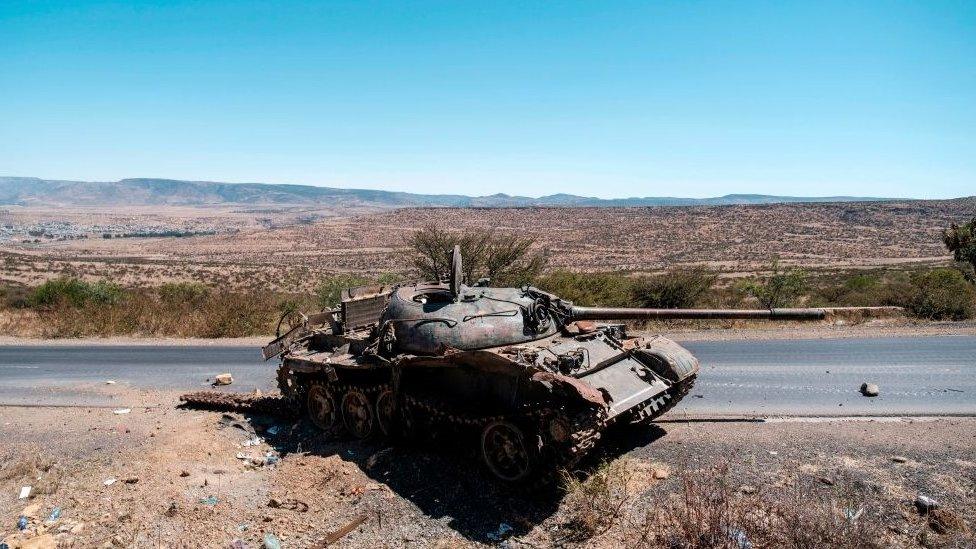Ethiopia's Tigray crisis: Report says war crimes may have been committed
- Published

Thousands of people have been killed in the war
All sides in Ethiopia's Tigray conflict have violated international human rights, some of which may amount to crimes against humanity, a new report states.
Extra-judicial executions, torture, rape, and attacks against refugees and displaced people were documented.
A joint investigation by the Ethiopian Human Rights Commission (EHRC) and the UN Human Rights Office said there could also be evidence of war crimes.
The war broke out on 4 November 2020.
It started when Ethiopian Prime Minister Abiy ordered an offensive against regional forces in northern Tigray region.
Government forces initially routed the rebels, but things changed in June with the Tigrayan fighters making significant territorial gains. They are now reportedly approaching the capital, Addis Ababa.
On Tuesday, the Ethiopian government declared a state of emergency hours after urging residents of the capital to arm themselves.
The war has created a humanitarian crisis. Thousands of people have been killed, millions displaced and hundreds of thousands in Tigray face famine conditions, according to aid organisations.
UN High Commissioner for Human Rights Michelle Bachelet said the conflict had been marked by extreme brutality and called for a lasting ceasefire.
"There are reasonable grounds to believe all parties to the conflict... either directly attacked civilians and civilian objects, such as houses, schools, hospitals, and places of worship, or carried out indiscriminate attacks resulting in civilian casualties and destruction or damage to civilian objects," the report states.
Unlawful or extrajudicial killings and executions have also been recorded.
The report details how a Tigrayan youth group known as Samri killed more than 200 ethnic Amhara civilians in Mai Kadra in November last year. Revenge killings were then committed against ethnic Tigrayans in the same town.
The Eritrean army has joined the conflict fighting alongside the Ethiopian government forces. Eritrean soldiers killed more than 100 civilians in Aksum in central Tigray later in November 2020, the report says.
"War crimes may have been committed since there are reasonable grounds to believe that persons taking no direct part in hostilities were wilfully killed by parties to the conflict," the report says.
It also cites cases of sexual violence including gang rape committed by both sides and targeting women, men, girls and boys.
In one incident a 19-year-old woman was detained and raped repeatedly for three months. A case of a woman with disability being sexually assaulted was also reported.
The report says sexual violence was used "to degrade and dehumanise the victims".
The organisations called on the Ethiopian government to conduct "thorough and effective investigations by independent and impartial bodies into allegations of violations and to hold those responsible accountable".
WATCH: On the ground with the Oromo Liberation Army
Prime Minister Abiy said he ordered the military offensive last November in response to an attack on a military base housing government troops there.
The escalation came after months of feuding between Mr Abiy's government and leaders of the TPLF, which was the dominant political party in Tigray.
The authorities later labelled the TPLF a terrorist organisation and ruled out any peace talks with them.
The federal government's renewed ground offensive in recent weeks, including using airstrikes, has failed to halt the rebels' territorial gains.
In a statement on Wednesday, Mr Abiy said the government had "serious reservations" about aspects of the joint report, external but added that his government was "heartened" that the investigation did not establish the claim of genocide against Tigrayans and did not give any evidence that the government had wilfully denied humanitarian assistance to people in Tigray, as some reports have suggested.
The spokesperson for the Tigray People Liberation Front said the report was "fraught with a number of problems,", external saying that the involvement of the EHRC was an "affront to the notion of impartiality".
More on the Tigray crisis: